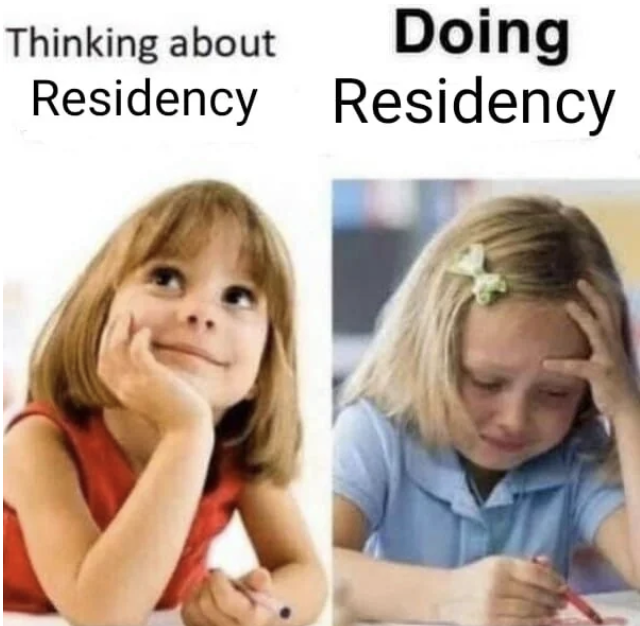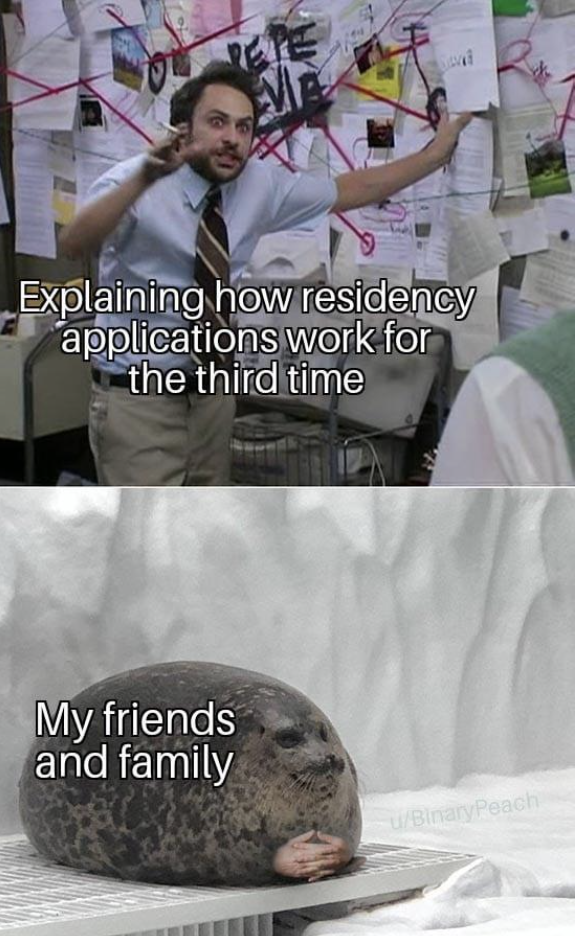Everything I Wish I Knew Before Applying For a Pharmacy Residency
Steph’s Note: After a couple weeks of clinical posts, we’re taking a little break to talk about life. Your professional life, that is. It’s always so fascinating to hear how people end up working where they are, and this week’s post is not only one such pharmacist’s story, it’s also chock full of tips and advice. As an added bonus, you just might learn about a new type of residency. (Kind of like when we filled you in on the community-based pharmacy residency program or CPRP! It’s not all about traditional pharmacy practice PGY1s anymore, folks!)
Here to share her story with us is Rachel Hauf, PharmD. Rachel obtained her bachelor's degree in biochemistry at Texas Tech University before continuing on with TTU’s pharmacy program. During pharmacy school, she worked as a pharmacist intern at Hendrick Medical Center. Rachel graduated in May 2023 and subsequently pursued NCODA's Medically-Integrated Oncology Pharmacy (MIOP) residency program at Texas Oncology in the Dallas-Fort Worth metroplex.
To be honest, I had no concept of what residency was when I began my expedition through pharmacy school. I was just a nervous P1 trying to survive the next exam or the next lab practical. Residency, fellowship, and whatever else was out there might as well have been light years away.
Don’t be fooled like I was, pharmacy school will go by in a flash. One day you open your eyes and realize four years have passed you by, and you’re almost a pharmacist.
What ultimately drove me to pursue residency was my fascination with the field of oncology. I can feel you all judging me – it’s definitely not for everyone. At the start of my P1 year in 2019 (just before COVID kicked off!), the National Community Oncology Dispensing Association (NCODA) student chapter at Texas Tech University School of Pharmacy had just been established, and I decided to join to discover more about the pharmacist’s role in oncology.
As the years passed, I took on more responsibility for our student chapter from secretary to president-elect and finally to president my P4 year. Our team was able to host Be the Match, hold various fundraisers, review positive quality interventions, connect with oncology professionals in different fields, and much more. These experiences were fundamental in my journey to residency.
By P3 year, my heart was set on becoming an oncology pharmacist. While most of my classmates had a clear aversion toward our oncology class, I found it fascinating. I had the opportunity to do a rotation at Texas Oncology, which reinforced my passion. The heightened level of patient care and interprofessional collaboration appealed to me. In addition, the pharmacists at Texas Oncology are able to have unique privileges thanks to pharmacy and clinic integration. This includes designing antiemetic regimens and making dose adjustments on behalf of physicians. Finally, I was deeply moved by the patient population; these patients are the most understanding and compassionate patients I have had the pleasure of caring for.
I had gone back and forth on whether or not I wanted to do a residency for years. Initially, I was sure I was going to do a residency; however, at one point down the line, I was faced with a lot of self-doubt and questioned if I was even capable of mentally handling a residency. Ultimately, I decided that I would do residency on one condition: it had to be oncology focused. I did not want to do a residency just to do a residency.
My career goal was always oncology pharmacy, and I wanted an experience that would immerse me in it from start to finish. I discovered NCODA’s medically-integrated oncology pharmacy (MIOP) residency program rather late in the traditional application cycle, as it was the first year they had established the program. I was instantly intrigued; they appeared to have everything I was looking for in a residency. The prospect of being a first-generation, pioneering resident with the opportunity to help shape the program’s future added another layer of excitement.
But you can still find something awesome, trust me!
The MIOP residency program partners with top cancer centers in the U.S., such as Texas Oncology and Florida Cancer Specialists, to facilitate resident training. The interview process was comparable to that of any traditional PGY-1 residency. Shortly after the application deadline, I was invited to an interview with the residency program director for Texas Oncology, Brandon Dyson (the tl;dr mastermind himself), and several of the area managers.
A couple of months later, I was offered the position as the first MIOP resident at Texas Oncology. I made the decision to withdraw from ASHP’s Match program and accepted the MIOP residency position. At that moment, I was hoping I had made the right decision.
Looking back, I am certain I did.
How to Prepare Yourself for the Residency Application Cycle
To be a competitive candidate for residency, you should start beefing up your CV at the start of your pharmacy school career. Some students are hesitant to work while in school. I know I was at first! But truly, get a job in a pharmacy and work, even if it’s only once a week or once every other week.
Find a schedule that works for you, but it is vital to have experience in a pharmacy beyond your rotations. Experience as a pharmacy technician or a pharmacist intern will make you much more valuable as a pharmacist. How can you expect to effectively manage technicians as a pharmacist without having been in their shoes?
Work experience is great, but you’ll need much more than that to impress a residency program director. Try your hand at tutoring. Dabble in research, get a publication or two. Compete in clinical skill competitions. Volunteer at free clinics, participate in drug take back events, and help out with vaccine clinics. Consider getting involved with student government.
Am I overwhelming you yet?
You don’t have to do all these things, of course. Quality over quantity.
Network, network, network. Did I mention networking? Get involved with student organizations. Don’t just join multiple organizations and attend the occasional meeting or two. Instead, actively participate. Quality over quantity, people, remember? Sign up for volunteer events, run for leadership positions, and see what opportunities there are with the parent organization.
Attend local, state, and/or national conferences. Seek out mentors who can offer guidance and feedback. Treat each rotation like an interview. The saying “pharmacy is a small world” is truer than you may realize. It’s a little frightening, actually. Be punctual, be respectful, and be engaged.
All those things should go without saying, but you’d be surprised by the number of students who don’t take their rotations seriously. Don’t be that person. On the topic of “don’ts,” don’t just stand around if there’s “nothing” to do. Find something. Ask the pharmacists and techs what you can do to help. Don’t be that intern that refuses to answer the phone or refuses to do “tech work.”
And finally, don’t be overconfident. No one likes a cocky pharmacy student, trust me.
Can’t forget about grades (sorry, folks). Depending on your school and on the class, attendance may not be required. All I have to say about that is…attend your classes. Professors notice who all shows up, and it may come back to bite you if you’re the type to play hooky. Small world and all.
Not to mention, actively listening to lectures will go a long way in your comprehension of the subject matter. Tempting as it may be for some, don’t cram and dump. It takes time and repetition to truly understand this material. Create flashcards, study guides, diagrams, whatever works for you.
So, now your CV has some substance to it. It’s time to really evaluate whether residency is for you. Think about why you want to do residency and how it is going to help you achieve your long-term goals. It’s not an easy journey, and you need to be up to the challenge. There are certain qualities you need to have to be a successful resident. Discipline, self-motivation, and strong communication skills with both patients and other members of the care team are essential.
(Image)
Do your research. Read through each program’s website thoroughly. Do they offer all the rotations you are interested in? Are there any special opportunities, such as teaching, that are a must-have for you? Think about location, too. Consider the salary and the cost of living. Can you see yourself living in this area? Does the organization’s mission and vision resonate with you?
Keep in mind, there’s only so much you can learn about a program from a website alone. Attend residency showcases and reach out to current or past residents. Pay attention to their demeanor. Do the residents look like the only thing keeping them going is a can of Red Bull? Or are they alert and excited to talk about the program and their experience? This will give you a glimpse into what your future will look like at that program.
How to Conquer Your Residency Applications
Start on your applications early, before the applications even open. Have your reference letter writers lined up. Draft a letter of intent (LOI) backbone. Polish up your CV. You want to take your time with these documents and review them frequently.
Choose your reference letter writers wisely. Only ask those who you are certain will write you nothing less than a great letter. Ask them well in advance and give them plenty of time to write the letter.
Personalize your LOI and really tailor it to each program. This is your opportunity to set yourself apart from other applicants. Showcase the attributes that will make you a great fit for their particular program, demonstrate that you’ve done your research, and emphasize what it is about this program that has inspired you to pursue it. Reference any common connections.
Know your deadlines! If you are not the type to keep a calendar, start now. The last thing you want is to put in all the effort in researching a program and writing the perfect LOI only to find out that the deadline was actually yesterday. At this point during P4 year you are stretched thin between rotations, grand rounds, studying for the NAPLEX, work, and residency applications. Don’t expect that you’ll be able to keep track of all the differing deadlines in your overloaded brain.
Some programs have special or unique requirements. Understand what documents you are expected to submit for each program. There are a few programs I can think of off the top of my head that sneak in a requirement somewhere on their webpage to ensure that you have actually done your research. So, stay sharp, my friends.
Keep in mind, the more programs you apply to, the more labor you will have to put in. LOIs take time to write, especially if you are individualizing them to each program like you should be doing. Personally, I feel that you should only apply to programs that you believe would be a good fit for you, can offer you a great residency experience, and will make you a priority.
This may be a hot take, but I would advise against mass applying in the hopes that you just match somewhere, regardless of the program’s quality. A lot of people ask, “How many programs should I apply to?” but there is truly no definitive answer. It’s not about the quantity (I’ve said it before, and I’ll probably say it again).
Consider your own professional goals and the standards you have for your future residency experience when deciding which programs to apply for.
How to Ace the Pharmacy Residency Interview
It’s a wonderful and relieving feeling when the interview offers start trickling in. Be proud of yourself, you’ve put in a lot of hard work to get here! Respond promptly, firstly thanking them for the interview offer. Confirm that you will be at the interview and restate the date and time they relayed to you. Reiterate your interest in the program.
If it wasn’t obvious, this is not the type of interview that you want to have the “I’m just gonna wing it” mentality. Prepare for the questions you’ll be asked. Review this document of 110 commonly asked residency interview questions developed by UCSF’s Phi Lambda Sigma chapter. You can also check out tl;dr’s Interview Mastery guide for more practice. Practice your interview skills with friends and family, and/or schedule mock interviews through your school’s career center.
Understand good group interview etiquette. The interviewers want to see that you can quickly integrate into a team and be both an active player and receptive to others. Don’t dominate the spotlight and edge others out of the conversation, but conversely, don’t be a fly on the wall. Find a balance.
When it comes to individual interviews, don’t be afraid to take time and think if you need to. A well thought out answer will be received much better. Don’t feel pressured to blurt out an answer, but you also don’t want to waste too much time contemplating. Feel free to ask to come back to a question at a later time if it is stumping you.
Wouldn’t you love to be a fly on this wall??
Although most of the interview process involves the program evaluating you, remember, you are also interviewing them. Pay close attention to the atmosphere of the interview. How do the preceptors, RPD, current residents, and other staff involved with the interview treat the applicants? There will also be time for you to ask questions. Take care to avoid questions that you could easily look up and find the answer to on your own time. Ask meaningful and unique questions.
Thank them in person at the conclusion of the interview itself. Again thank them for the interview a day or two after the interview occurs. Mention specific names and conversational points that you resonated with. If you have any other follow-up questions, don’t be afraid to reach out again.
What Every Pharmacy Residency Applicant Should Know about the Match
Once you’re done with interviews, the agonizing wait for Match Day begins (or not, if you’ve accepted an offer from a non-ASHP accredited program). Don’t put off entering your rankings for your own peace of mind and while your interview experiences are still fresh. You can always go back and change them around before the deadline.
(Image)
Of course, we hope for the best, but not everyone matches. If you don’t match, know it’s not the end of the world. Phase 2 is still an option, but don’t put your eggs all in one basket. Explore additional options. Read this tl;dr article by Savannah Mageau describing her personal experience with not matching, and how it ultimately led her to a job she loves.
How to Survive and Thrive During Pharmacy Residency
Residency should be a period of vast professional and personal improvement. To maximize your experience, hold yourself to a high standard and bring your A game every day. Be open to the opportunities that come your way. When people come to me with extra projects or questions that aren’t technically “my job” or something that I have to do, I always happily accept the opportunity (as long as I have the bandwidth to help out!). Know your limits- don’t be afraid to say no sometimes if you are overloaded.
Be receptive to learning from everyone, not just your preceptors. Physicians, nurses, medical assistants, nurse practitioners, and physician’s assistants all have unique knowledge bases, much of which is relevant to pharmacists. Shadow as many different members of the healthcare team as you can. This will allow you to have a better understanding of the entire patient experience, and in turn, will make your place in patient care clearer.
Make an effort to integrate with the staff at each rotation site and build your credibility. Establishing rapport goes a long way, and they will be more open to collaboration and receptive to your recommendations. Evaluate how you can best fit into the workflow and determine what the staff needs from you. Some sites rely on pharmacists much more or in different ways than other sites.
See what extracurriculars you can get involved with. Healthcare organizations have a number of committees, such as P&T, that you can learn a lot from just by listening in. There may be opportunities to present to P&T, provide education to other healthcare professionals through inservices, publish articles, or attend conferences.
My Experience with NCODA & the MIOP Residency
Before applying for this residency, I didn’t have a good grasp of what a medically-integrated oncology pharmacy actually was. A medically-integrated pharmacy is a dispensing pharmacy that is physically present within an oncology clinic. There is an emphasis on patient-centered care and an interprofessional team-based approach to ensure comprehensive care. This arrangement facilitates better coordination of care, improves medication adherence, and reduces waste, leading to superior patient outcomes.
All members of the interdisciplinary team have access to the same electronic health information, including the pharmacy. This permits the pharmacist to practice at the top of their license, make impactful interventions, and play an essential role on the care team. It is really a great system, and I believe it is how most pharmacies should operate.
As I am writing this, I am about 7 months into the MIOP residency at Texas Oncology, and I have developed so much professionally and in terms of clinical knowledge. Each rotation delves into a specific malignancy or malignancies with additional rotations in administration/management, pediatrics, and teaching. The flexibility of this program is another big plus. I brought up my interest in the idea of a teaching component of the residency, and the residency committee established an education rotation. Additionally, there are multiple extracurricular opportunities through Texas Oncology and NCODA to further develop clinical, leadership, research, and oratory skills.
It is worth mentioning that this residency program is not ASHP-accredited. The ASHP Accreditation Standard for Postgraduate Residency Programs contains stringent requirements for participating programs to ensure quality and comparable experiences across different programs. However, these standards are not feasible for many programs, especially those that aren’t an academic medical center.
ASHP requires that residents have diverse patient care experience in a variety of disease states. Their standards specify that “no more than one-third of direct patient care learning experiences in a twelve-month residency program may focus on a specific disease state or population.” You can see how this would be an issue for an institution such as Texas Oncology– or any specialty healthcare organization. It would be near impossible to create an experience with less than one-third exposure to oncology in a center that specializes in oncology.
Since I was certain that I wanted to be an oncology pharmacist, I knew only a non-accredited program could offer me the highly specialized first-year residency experience I desired. My mastery of oncology has grown exponentially in this time, but so has my conceptualization of how rapidly the treatment landscape in this space evolves. This residency has provided me with a solid foundation in cancer care and has given me the tools to adapt to the ever-changing landscape as a lifelong learner.
I am fortunate to have wonderful preceptors and a program director who are dedicated to my clinical and professional development. I am confident that I will be fully equipped for success in any oncology environment by the end of this residency.
My last piece of advice is this: be picky. Pursue programs with individuals who will push you but also support you, with a clinical environment you enjoy, a healthy organizational culture, and an experience that will help you accomplish your long-term goals.
For more tips and advice on how to be the best residency candidate, check out tl;dr’s Mastering the Match.





